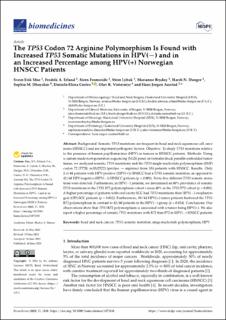The TP53 Codon 72 Arginine Polymorphism Is Found with Increased TP53 Somatic Mutations in HPV(−) and in an Increased Percentage among HPV(+) Norwegian HNSCC Patients
Moe, Svein Erik Emblem; Erland, Fredrik Atteraas; Fromreide, Siren; Lybak, Stein; Brydøy, Marianne; Dongre, Harsh Nitin; Manueldas, Sophia; Costea, Daniela Elena; Vintermyr, Olav Karsten; Aarstad, Hans Jørgen
Journal article, Peer reviewed
Published version

Åpne
Permanent lenke
https://hdl.handle.net/11250/3127286Utgivelsesdato
2023-06-26Metadata
Vis full innførselSamlinger
- Department of Clinical Medicine [2066]
- Registrations from Cristin [9791]
Sammendrag
Background: Somatic TP53 mutations are frequent in head and neck squamous cell carcinoma (HNSCC) and are important pathogenic factors. Objective: To study TP53 mutations relative to the presence of human papillomavirus (HPV) in tumors in HNSCC patients. Methods: Using a custom-made next-generation sequencing (NGS) panel on formalin-fixed, paraffin-embedded tumor tissue, we analyzed somatic TP53 mutations and the TP53 single-nucleotide polymorphism (SNP) codon 72 (P72R; rs1042522) (proline → arginine) from 104 patients with HNSCC. Results: Only 2 of 44 patients with HPV-positive (HPV(+)) HNSCC had a TP53 somatic mutation, as opposed to 42/60 HPV-negative (HPV(−)) HNSCC patients (p < 0.001). Forty-five different TP53 somatic mutations were detected. Furthermore, in HPV(−) patients, we determined an 80% prevalence of somatic TP53 mutations in the TP53 R72 polymorphism cohort versus 40% in the TP53 P72 cohort (p = 0.001). A higher percentage of patients with oral cavity SCC had TP53 mutations than HPV(−) oropharyngeal (OP) SCC patients (p = 0.012). Furthermore, 39/44 HPV(+) tumor patients harbored the TP53 R72 polymorphism in contrast to 42/60 patients in the HPV(−) group (p = 0.024). Conclusions: Our observations show that TP53 R72 polymorphism is associated with a tumor being HPV(+). We also report a higher percentage of somatic TP53 mutations with R72 than P72 in HPV(−) HNSCC patients.
